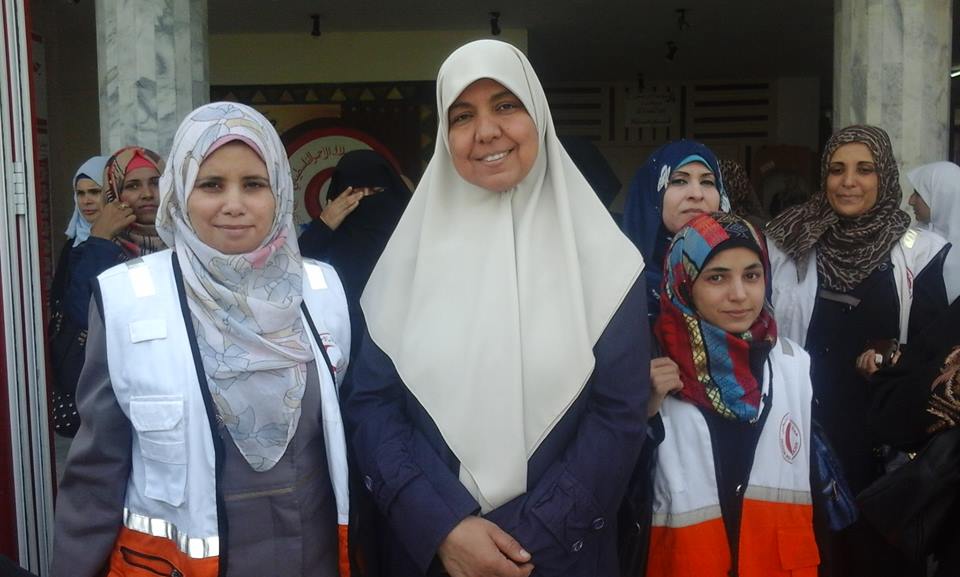
My name is Um Ahmad Shamlakh. I live in a village called Al-Shiekh Ejleen in the Gaza strip. I am a mother of five grown children and a widow. I am also a volunteer in Palestine Red Crescent Society (PRCS). I am a member of the PRCS Community Awareness Committees (CAC) and volunteer the PRCS Primary Health Care Clinic in my village.
My story of volunteering with PRCS began when I joined the safe motherhood committee at PRCS’ Khalil Alwazeer clinic in 2002.
After my husband’s death, I faced many challenges and I needed guidance and support, so I went to talk to the social worker at the PRCS primary health clinic. I ended up getting much more than that, because I started volunteering and received training in first aid and psychosocial support.
At that time, it was difficult for any woman to challenge the region’s social habits which impose the traditional reproductive role as housewife only on women. For that reason I felt a responsibility towards women in my area and the need to change these old ideas and to advocate for women’s participation through community awareness. Slowly we expanded our work from our village to include surrounding
villages and areas.
I felt a positive change in the way people behaved towards me and treated me. I became a well-known woman in the area where I live. I had a real entity. When the clinic was closed, people would come to me to have their blood pressure taken, and I could provide health messages and recommendations about issues relating to marital, social and psychological problems for both women and children. I felt responsible as a volunteer for improving my community and changing many unhealthy behaviors.
During the latest three brutal wars on Gaza, my colleagues and I had vital role in alleviating the people’s suffering. The last war was the most difficult and longest, and many lives were lost. In order to reduce human and material loss as much as possible, we created community awareness messages such as:
• Prepare a first aid bag and keep it in a safe and accessible place.
• If members of the family need medication, prepare it and keep it in a bag that can be carried easily.
• Alleviate children’s fear through playing games, drawings etc. especially during continues bombing.
• Disseminate very important messages about First Aid
• related to the situation among people and families.
• Make sure everyone knows how to evacuate safely
During the last war, Israeli rockets attacked the Khalil al-Wazir mosque and the primary health clinic, which is located near our home. During the attack we were about 33 people inside the home. When we heard the warning rockets, we moved to a safer place – even if no place is really safe during a bombardment. The children started to scream and cry My colleagues and I tried to reduce the worries of adults and to play and talk with kids to let them feel safe.
Lack of water was the biggest problem that we faced during the war, but we managed this issue by providing the adults with information about water protection and re-using it again for the purpose of cleaning and how to sterilize water.
I went to the shelter centre, where the situation was very bad because of the high numbers of displaced people and too few bathrooms. To resolve this problem we organized a rotation plan for using and cleaning the bathrooms among the families in cooperation with the centre administration.
In addition to that, we raised the awareness about the risks of some communicable diseases as a result of lack of hygiene and PRCS provided us with cleaning materials and publications about how to get rid of accumulated waste.
After the war we provided psychological support sessions for both women and children. In addition we divided children into groups and corners for activities such as drawing,
stories, games. Despite the fact that the children had access to coloured crayons, most of them made drawings in grey pencils describing the destruction of the war.
Finally, we made home visits to injured people and families who had lost loved ones in my area to check their safety and provide the psychological and community support.
End.